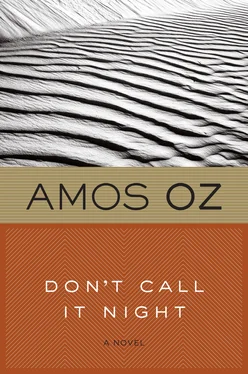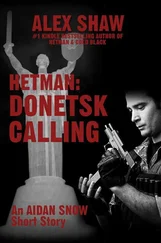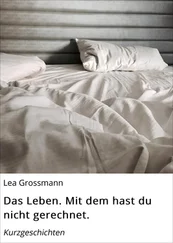As they entered Qiryat Tiv'on she stopped the car. She woke him up and told him, for some reason, that in the northern tip of Galilee there was a kibbutz called Dafna, and she showed him on his map where it was. Then she dropped him off, with his backpack that looked like a wet mass of rock. After a moment she stopped and looked in the rearview mirror, but she was dazzled by the lights of an oncoming truck, and all she could see behind the car was an unlighted telephone box in the rain.
After registering, she left her things in the bedroom, where two teachers twenty years younger than herself, one of them very pretty, had already settled in, and went to the opening lecture, which was on the subject of whether there is such a thing as women's literature or feminine literature and, if so, what its particular characteristics are. After a quarter of an hour she got up suddenly and went outside to the parking lot in the rain, started the car and went to look for her hitchhiker at the spot where she had dropped him off, just before Qiryat Tiv'on, because she felt she ought to take him to see a doctor. Perhaps she also wanted to ask him how shortage of time is self-defeating and what he had meant when he said that anyone who has some goodwill can find goodwill everywhere. But when she got there she didn't find the boy, only the unlighted telephone box in the mud by the roadside.
Instead of going back to the conference she turned northwards at the T-junction and drove through the thickening fog along roads she did not know, until she noticed that she was almost out of gas and pulled into a filling station near the village of Majd el-Kurum. The filling station was closed, but a couple of young men were sitting inside under a bright neon light, apparently totting up the day's accounts. Seeing her silhouetted at the locked door they hesitated and whispered to one another, then one of them got up and opened the door, jokingly remarking that they had taken her for a robber and filled the tank for her. His companion offered her coffee and said, You're not the first visitor we've had tonight, lady, look what we've got here. In a corner of the office, on the greasy floor, curled up and swaddled like a fetus in a grubby blanket, she saw the shock of flaxen hair and she woke him and said, Let's go and find you a doctor.
He trailed after her to the car, drowsy, silent, feverish, and not at all surprised to see her: as though he had not doubted that she was destined to find him and pick him up again that night. He sat down next to her again, his teeth chattering, his backpack with its love slogan dripping into his lap, and after two minutes he fell asleep. He may not even have waked up when she dragged him out of the filling station. His head landed on her shoulder and his blond hair fell over her chest. His heat penetrated through her sweater and wet the hollow of her neck. At the junction after Majd el-Kurum she turned right, because she had made up her mind to go back to the conference centre, wake up a doctor or a nurse, and in the morning sit down at the telephone and try every kibbutz in turn until she found his Daphne or at least located a place where they would take him in and give him some work. But she lost her way, fog and water obscured the windows on the outside and the inside misted up with their breath, and close on midnight she passed Kibbutz Mazzuva and noticed an illuminated sign indicating a hostel in a few miles. She decided to get them a room for what was left of the night. After a few bends the engine died. She parked in a turnout under tall eucalyptus trees lashed by the winds and sat waiting for morning. His head was in her lap by now. She pulled the blanket off the back seat and spread it over him and over herself, so that he should not freeze to death. Then she fell asleep too. When she was awakened by the grey light of dawn she found that the rain had stopped and the hitchhiker had vanished with his backpack. For a moment she feared for her handbag, which contained her papers, keys and cash, but a short search revealed it in the space between her seat and the door. At half past six a police patrol car drew up. A middle-aged Arab policeman flashed his gold teeth at her, reprimanded her for taking risks, and managed to get the engine started. At eight o'clock, back at the conference centre, she called me at the office and told me her story, and asked me to try to find her sick passenger. Maybe there was a girl from Liverpool called Daphne, working with sheep, on the register of kibbutz volunteers? Or maybe the Ministry of the Interior would have a record of a young Irishman from Galway who had landed in Israel yesterday?
I thought the chances were remote, but something in her voice on the phone made me promise to try. I spent the morning dialling all over the place, I even located a couple of highly placed acquaintances I hadn't had any contact with for twenty years and called them on her behalf, but naturally it was useless. All I got at the other end of the line was perplexity or bewilderment barely disguised as polite surprise. She got home that evening, having abandoned her conference, surprised me in the kitchen, dishevelled, feverish, trembling, seized me, hid her face in my shoulder and started to cry. I took her frozen, veiny, old woman's hands in mine and tried to warm them. Then I ran a hot bath, took off her clothes and put them straight in the laundry basket, soaped and rinsed her, dried her in a thick bath towel and wrapped her in a warm dressing gown. I almost carried her to her bed. I made a pot of tea and poured her a cup, leaving the rest in a Thermos by the bed. Then I rang for the doctor. Noa slept for sixteen hours. When she woke up she stared at me blankly for ten minutes, looking distant and forlorn. I gave her some herbal tea with honey and lemon. She only took a sip, then suddenly she exploded in a rage at me, with a kind of strident hatred she had never displayed before, except perhaps on rare occasions when she tried to amuse me by imitating her father's fits of fury, because I had added a spoonful of cough syrup that the doctor had prescribed and that she had obstinately refused to take. She raised her voice and shouted painfully that I was trying to baby her again, that I was a dead weight on her life, oppressing and depressing her so that she would age prematurely, this apartment was just a cage, Tel Kedar was a penal colony, and I shouldn't be surprised to wake up one morning and find myself alone like an old dog, and maybe that was exactly what I wanted.
By next morning she felt better. Her temperature was down and her joints were less painful. She asked me to forgive her. She apologized. She sat down in front of the mirror and made herself up carefully, much more than usual, and, still facing the mirror with her back to me, told me again about the Irish hitchhiker she had lost. Then she put on a green pantsuit that suited her very well and went to school so as not to have to put off a test. I had intended to stop her, because the doctor had ordered several days' rest, but on careful reflection I decided to say nothing. Still, as she stood in the doorway I couldn't stop myself saying, almost in a whisper, Maybe you ought to stay here. For a moment she looked at me, amused, and suddenly she said, not angrily, Don't worry, I'll come back to you. You took lovely care of me.
Since that December morning a year and a half ago she has never said a word about her hitchhiker. And I haven't mentioned him either. A week after she recovered she called me at work one day and asked me to come home late, at seven instead of five. I got back at seven fifteen to find that she had made us a splendid three-course dinner with sparkling wine and a dessert. But I still had to put the car in for major repairs. Jacques Ben Loulou from Ben Elul's Garage said, Look here, she's really been in the wars, somebody's been driving her over stones and rocks and then got stuck in the mud, and after that she's got bent, here, here as well, because she wasn't towed properly. It's none of my business, Theo, but you can take it from me that whatever the true story is, it isn't a nice one.
Читать дальше












